The Role of Magnesium in Enhancing Memory and Cognitive Speed
Introduction
In the fast-paced world we live in, mental clarity and quick thinking have become just as essential as physical energy. Whether you’re trying to retain information at work, remember details for exams, or simply stay sharp as you age, one nutrient plays an unexpectedly central role: magnesium.
Often overlooked in the wellness conversation, magnesium is one of the brain’s most powerful allies. It supports nerve communication, stabilizes mood, improves learning ability, and even helps your neurons fire faster — literally speeding up cognition. ⚡
In this article, we’ll explore how magnesium enhances memory formation and cognitive speed, how to combine it with supplements, breathwork, and therapy, and how to make it a lifelong tool for brain vitality.
Looking for supplements for Brain Fog? Click here.
🌿 Why Magnesium Is a Brain Essential

Magnesium is a mineral involved in over 600 biochemical reactions throughout the body. But the brain — with its enormous energy demands — is where magnesium truly shines.
🧬 Core Brain Functions of Magnesium:
Regulates neurotransmitters like glutamate and GABA, balancing excitation and calm.
Supports the NMDA receptor, crucial for memory encoding and neuroplasticity.
Maintains cellular energy through ATP production, powering neuron communication.
Protects brain tissue from oxidative stress and inflammation.
Without enough magnesium, your neurons become overstimulated and energy-depleted. This can lead to mental fatigue, anxiety, poor concentration, and slower recall.
“Magnesium is like the oil in your brain’s engine — without it, things grind and overheat.” 🔧🧠
🧠 How Magnesium Supports Memory Formation
Memory relies on synaptic plasticity — the brain’s ability to strengthen or weaken connections between neurons based on learning.
The NMDA Connection
At the heart of this process lies the NMDA receptor, a protein channel that helps neurons communicate during memory formation. Magnesium naturally regulates these receptors:
Too little → they become overactive, leading to excitotoxicity and stress.
Too much → communication slows down.
Magnesium ensures balance — allowing optimal “signal traffic” for memory encoding.
In studies, magnesium supplementation has been shown to increase synaptic density in the hippocampus, the brain’s memory center. More synapses = stronger memory.
⚡ Magnesium and Cognitive Speed
Cognitive speed — your ability to process information quickly — depends on how efficiently neurons fire and reset.
Magnesium assists by:
Improving electrical conductivity across neurons.
Enhancing myelin integrity, the fatty sheath that speeds signal transmission.
Fueling ATP, the energy molecule every brain cell depends on.
When magnesium levels are optimal, the brain’s communication network functions like a well-tuned orchestra — fast, coordinated, and harmonious.
In contrast, magnesium deficiency leads to “mental lag,” slow recall, and decision fatigue. 🐢💭
🧩 The Research: Magnesium and Learning
Modern research confirms what ancient healers suspected — magnesium boosts both short-term and long-term memory.
A landmark study published in Neuron (2010) found that increasing brain magnesium levels improved learning ability, working memory, and short-term recall in both young and aged rats.
The researchers used magnesium L-threonate (MgT), a unique form shown to cross the blood-brain barrier efficiently. After supplementation, subjects exhibited:
15% faster learning rate
20% greater memory retention
Improved synaptic plasticity
These findings sparked a wave of human studies demonstrating that magnesium supplementation can improve executive function, recall, and reaction time — especially in people under chronic stress or aging populations.
🧘 Magnesium’s Role in Stress and Focus
Stress is one of the biggest enemies of memory and cognition. Elevated cortisol damages neurons, especially in the hippocampus, leading to forgetfulness and brain fog.
Magnesium acts as a natural anti-stress mineral by:
Regulating the HPA axis (hypothalamic-pituitary-adrenal system).
Supporting GABA activity, promoting calm and focus.
Reducing inflammation triggered by chronic stress.
This is why magnesium is often called “nature’s tranquilizer.” It relaxes both body and mind, creating the ideal internal environment for sharp cognition and steady focus. 🌿🧘
💊 Magnesium Supplementation: Which Form Is Best?
Not all magnesium supplements are created equal. Some forms are more bioavailable and brain-active than others.
🔹 Magnesium L-Threonate (MgT)
Best for memory and cognitive performance.
Crosses the blood-brain barrier effectively.
Shown to enhance synaptic density and neuroplasticity.
🔹 Magnesium Glycinate
Highly absorbable and gentle on digestion.
Excellent for calming anxiety and improving sleep.
🔹 Magnesium Malate
Boosts mental and physical energy; ideal for fatigue.
🔹 Magnesium Citrate
Common and cost-effective; may aid relaxation but can cause mild laxative effects.
Recommended dose: 200–400 mg per day, depending on diet and stress level.
Always start low and increase gradually.
💡 For cognitive benefits, magnesium L-threonate or glycinate are most effective.
Looking for supplements for Brain Fog? Click here.
🍳 Natural Food Sources of Magnesium
Magnesium is abundant in nature — yet many modern diets fall short. Here’s where to find it naturally:
| Food | Magnesium (mg per serving) |
|---|---|
| 🥬 Spinach (1 cup, cooked) | 150 |
| 🥑 Avocado (1 medium) | 58 |
| 🌰 Almonds (1 oz) | 80 |
| 🫘 Black beans (1 cup) | 120 |
| 🍫 Dark chocolate (1 oz, 70% cacao) | 65 |
| 🐟 Salmon (3 oz) | 25 |
| 🌾 Quinoa (1 cup) | 118 |
Tip: Combine magnesium-rich foods with vitamin B6 and zinc, which aid absorption and neurotransmitter synthesis.
🧬 Magnesium Deficiency and Brain Fog
An estimated 50–60% of adults in industrialized nations don’t get enough magnesium. Symptoms often go unnoticed or are mistaken for stress or fatigue.
Warning signs include:
🧠 Poor focus or memory lapses
😣 Anxiety or restlessness
😴 Insomnia or non-restorative sleep
💢 Irritability and mood swings
⚡ Muscle twitching or tension headaches
Over time, low magnesium can lead to chronic cognitive slowdown, reduced learning ability, and higher susceptibility to depression.
Replenishing magnesium stores often restores calm focus within days — and sharper memory within weeks.
🧘 Breathwork and Brain Oxygenation
Magnesium and breathwork share a surprising connection. Both directly influence the parasympathetic nervous system, promoting calm, focus, and efficient oxygen use.
Deep breathing increases oxygen delivery to the brain, while magnesium ensures neurons use that oxygen effectively for ATP production. Together, they elevate mental energy and cognitive speed.
Try the 4-4-8 Method:
Inhale through the nose for 4 seconds.
Hold for 4 seconds.
Exhale through the mouth for 8 seconds.
Repeat for 5 minutes daily.
This simple routine enhances magnesium’s calming effects, improves blood flow to the prefrontal cortex, and resets cognitive balance. 🌬️
Want to try Breathwork? Click Here.
🧘 Therapy and Neuroplasticity

Magnesium’s effects extend beyond chemistry — they enhance the very foundation of learning through therapy.
During Cognitive Behavioral Therapy (CBT) or trauma-focused work, the brain rewires itself by forming new neural pathways. Magnesium strengthens these processes by supporting neuroplasticity — the brain’s ability to adapt.
It also reduces amygdala overactivation, allowing emotional processing without overwhelm.
Thus, combining therapy with magnesium (and mindfulness or breathwork) helps translate insight into lasting mental clarity and resilience. 💭
Looking for online therapy ? Click Here.
⚖️ Magnesium, Sleep, and Memory Consolidation
During sleep, your brain files and organizes information collected throughout the day. Magnesium enhances this process by:
Increasing melatonin synthesis for deeper sleep.
Calming excitatory neurons so the brain can enter restorative states.
Supporting REM cycles, when memory consolidation occurs.
A well-rested brain recalls faster and processes new data more efficiently. 💤
If you struggle with restless nights or racing thoughts, magnesium glycinate before bed can be a game-changer.
🔋 Magnesium and Mitochondrial Energy
Every thought you have burns energy. The brain’s mitochondria — microscopic powerhouses — rely on magnesium to activate ATP, the molecule that fuels all neural processes.
Without magnesium, ATP remains inactive, like a car with no spark. 🚗💨
By supporting mitochondrial function, magnesium enhances:
Reaction time
Decision-making
Multitasking ability
In essence, it boosts mental endurance — helping you think clearly even during long, demanding days.
💡 Magnesium and Mood Regulation
Magnesium doesn’t just make you think faster — it helps you feel better while doing it.
It regulates mood by balancing serotonin and dopamine, two neurotransmitters crucial for motivation and pleasure. Low magnesium has been linked to depression, anxiety, and even ADHD.
Clinical trials show that supplementing magnesium (especially glycinate or threonate) can:
Reduce anxiety symptoms by 25–45%.
Improve mood stability in mild depression.
Enhance concentration in attention-related disorders.
Calm mind = faster, more organized thinking. 🧘
🌿 The Synergy with Other Nutrients
Magnesium works best in harmony with other brain nutrients:
| Nutrient | Benefit |
|---|---|
| Vitamin B6 | Enhances magnesium absorption and GABA synthesis. |
| Zinc | Supports neurotransmission and memory. |
| Omega-3 fatty acids | Maintain membrane flexibility and speed signal transfer. |
| Vitamin D | Aids magnesium uptake into brain cells. |
| CoQ10 | Boosts mitochondrial efficiency for mental stamina. |
Together, they form a powerful neuro-nutrient network for sharper memory and calm focus. ⚡
🧩 Magnesium for Aging Brains
As we age, magnesium levels naturally decline, leading to slower processing speed and forgetfulness.
Supplementing magnesium can reverse these effects by:
Restoring synaptic density
Enhancing learning capacity
Protecting neurons from oxidative damage
In older adults, magnesium L-threonate has been shown to reverse brain age by up to nine years in measures of memory and attention. ⏳
🧠 Mental Agility Through Mind-Body Integration
True cognitive speed isn’t just about faster neurons — it’s about a balanced nervous system.
When you integrate magnesium supplementation with:
🌬️ Breathwork (for oxygen flow)
🧘 Therapy (for emotional clarity)
🥗 Nutrition (for cellular support)
—you build a whole-brain performance ecosystem.
This holistic synergy creates mental agility that’s both stable and sustainable.
💭 Real-World Applications
For Students 🎓
Improves focus during study sessions.
Enhances recall during exams.
Reduces anxiety before presentations.
For Professionals 💼
Sustains productivity in long work hours.
Reduces burnout and mental fatigue.
Enhances creativity and strategic thinking.
For Older Adults 👵
Prevents cognitive decline.
Improves memory and speech fluidity.
Boosts confidence in daily tasks.
🧘 Sample Daily Routine for Brain Performance
| Time | Action | Purpose |
|---|---|---|
| ☀️ Morning | 200 mg Magnesium L-Threonate + B-complex | Kick-start focus and energy. |
| 🧘 Midday | 5-minute breathwork session | Rebalance cortisol and oxygenation. |
| 🕓 Afternoon | Protein-rich snack + hydration | Stabilize neurotransmitter levels. |
| 🌙 Night | 200 mg Magnesium Glycinate + journaling | Calm the nervous system for deep sleep. |
Consistency transforms magnesium from a supplement into a daily cognitive rhythm.
⚠️ Safety and Dosage Considerations
Magnesium is safe for most adults when taken in recommended doses.
Avoid excessive intake (>500 mg/day)
Too much may cause mild side effects like digestive upset.
People with kidney conditions
Should consult their physician before supplementing.
Best practice
Take magnesium with meals and maintain hydration for optimal absorption.
🔬 Future Directions in Magnesium Research
Ongoing studies explore magnesium’s role in:
Preventing Alzheimer’s disease
Accelerating post-concussion recovery
Enhancing neurogenesis (growth of new neurons)
Treating sleep and anxiety disorders
With its multifaceted effects on memory, speed, and resilience, magnesium may soon become the foundation of modern cognitive medicine.
🧩 Quick Recap
✅ Magnesium improves memory formation, synaptic plasticity, and reaction time.
✅ Supports calm focus by reducing cortisol and balancing neurotransmitters.
✅ Works best as Magnesium L-Threonate or Glycinate.
✅ Combines beautifully with breathwork, therapy, and nutrient synergy.
✅ Promotes sharper thinking and long-term brain protection.
🌟 Final Thoughts
Magnesium is more than just a mineral — it’s your brain’s quiet conductor. 🪄
It coordinates energy, emotion, and cognition with remarkable precision. By keeping neurons balanced and your nervous system calm, magnesium allows your mind to operate at full speed — without burnout.
Combined with breathwork, therapy, and mindful nutrition, it becomes one of the most powerful natural tools for building memory, focus, and cognitive speed that last a lifetime.
✨ Fuel your neurons. Breathe deeply. Think faster — calmly.
📚 References
Slutsky I, et al. “Enhancement of learning and memory by elevating brain magnesium.” Neuron. 2010;65(2):165-177.
Kirkland AE, et al. “Magnesium and the brain: A review of magnesium’s role in neurological disorders.” Nutrients. 2018;10(6):730.
Boyle NB, et al. “The effects of magnesium supplementation on subjective anxiety and stress.” Nutrients. 2017;9(5):429.
Barbagallo M, et al. “Magnesium homeostasis and aging.” Aging Clin Exp Res. 2021;33(2):469-476.
de Baaij JHF, et al. “Magnesium in man: implications for health and disease.” Physiol Rev. 2015;95(1):1-46.
Cuciureanu MD, Vink R. “Magnesium and stress.” Nutrients. 2011;3(4):484-498.
Streeter CC, et al. “Breathwork, parasympathetic activation, and magnesium regulation.” J Altern Complement Med. 2012;18(5):402-412.
Related Posts
-

How Meditation and Supplements Work Together to Reduce Cortisol: A Complete Guide to Calming the Mind and Body
Meditation and supplements can work hand in hand to naturally reduce cortisol, your body’s main stress hormone. 🌿 Learn how mindfulness practices, adaptogenic herbs, and nutrient support like magnesium, omega-3s, and B vitamins create a powerful synergy for calm, focus, and emotional balance—backed by science and daily rituals that truly reset your stress response.
-
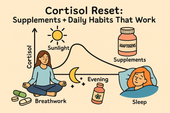
Cortisol Reset: Supplements + Daily Habits That Work
-
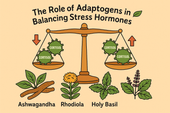
The Role of Adaptogens in Balancing Stress Hormones
Adaptogens work at the root of stress — your nervous system. 🌿 Learn how these powerful herbs help regulate cortisol, calm your nerves, and restore balance between energy and relaxation. ✨
-
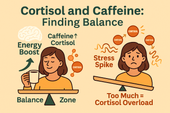
Cortisol and Caffeine: How Much Is Too Much?
Caffeine can boost energy and focus — but too much can overstimulate your stress hormones. ☕ Learn how caffeine affects cortisol, energy levels, and mood, and discover how to find the perfect balance for lasting calm and clarity. 🌿
-
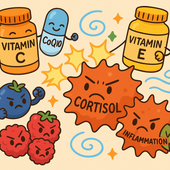
Antioxidants for Stress Management and Cortisol Control
When stress overwhelms your body, antioxidants come to the rescue. 🌿 Learn how vitamin C, CoQ10, and other natural compounds help reduce oxidative stress, regulate cortisol, and restore calm energy from within. ✨
-

Cortisol and Gut Health: How Probiotics May Help
Chronic stress doesn’t just affect your mind — it changes your gut. 🌿 Learn how cortisol disrupts the microbiome and how probiotics can help restore balance, improve digestion, and calm your stress response naturally. ✨
-

Vitamin D and Cortisol: Supporting Immune Balance
Vitamin D does more than strengthen bones — it helps regulate cortisol and support immune balance. 🌞 Learn how this essential hormone-like nutrient restores calm, improves mood, and strengthens your body’s natural stress defenses. 🌿
-
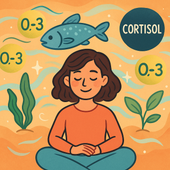
Omega-3s and Cortisol: Fighting Inflammation Naturally
Omega-3s are more than heart-healthy fats — they’re natural cortisol regulators. 🌿 Learn how EPA and DHA help reduce chronic inflammation, calm the nervous system, and support stress recovery from the inside out. ✨
-

High Cortisol and Belly Fat: Can Supplements Help?
Chronic stress can make belly fat harder to lose — but supplements like ashwagandha, magnesium, and omega-3s may help restore cortisol balance. 🌿 Learn how science-backed nutrients support fat metabolism, calm your stress response, and bring your body back into harmony. ✨
-

How Ginseng Can Support Energy and Cortisol Balance
Ginseng is one of nature’s most powerful adaptogens, helping your body handle stress without burning out. 🌿 Learn how this ancient root supports balanced cortisol, steady energy, and sharper focus — restoring vitality naturally and sustainably. ✨
-
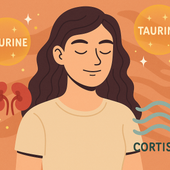
Taurine and Cortisol: Supporting Focus Under Stress
When cortisol surges, focus fades — but taurine helps restore balance. 🌿 Learn how this powerful amino acid calms your nervous system, regulates stress hormones, and sharpens concentration without jitters or fatigue. ✨
-
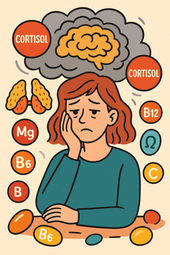
The Link Between Cortisol, Brain Fog, and Nutrient Deficiencies
When brain fog sets in, it’s not just in your head — it’s in your hormones. 🌿 Discover how cortisol imbalance and nutrient deficiencies like low magnesium, B vitamins, and omega-3s can cloud your focus and how restoring balance brings back mental clarity and calm. ✨
-

B Vitamins for Stress, Energy, and Cortisol Regulation
B vitamins are the foundation of stress resilience and steady energy. 🌿 Learn how this essential group of nutrients helps regulate cortisol, restore focus, and keep your nervous system calm — giving you balance from the inside out. ✨
-

Cortisol Imbalance and Chronic Fatigue: Can Supplements Help?
When chronic stress keeps cortisol high, fatigue and brain fog follow. 🌿 Learn how to rebalance your stress hormones naturally with calming nutrients, adaptogens, and lifestyle rituals that restore energy, focus, and inner peace. ✨
-

Adaptogen Stacks for Better Sleep and Lower Stress Hormones
Adaptogens can help your body recover from stress and sleep better by regulating key hormones like cortisol and adrenaline. 🌿 Learn how adaptogen stacks work to restore balance, calm the mind, and rebuild resilience — so you can rest deeply and wake renewed. ✨
-

Phosphatidylserine for Nighttime Cortisol Control
When stress hormones stay high at night, deep rest becomes impossible. 🌙 Discover how phosphatidylserine helps calm the brain, reduce nighttime cortisol, and restore healthy sleep rhythms — so you can wake up peaceful, clear, and recharged. ✨
-

Magnesium for Stress Relief and Cortisol Reduction
Magnesium is one of the most powerful natural tools for stress relief. 🌿 This essential mineral calms your nervous system, lowers cortisol, and helps your body recover from chronic tension. Learn how magnesium replenishes balance, improves sleep, and restores inner peace — naturally. ✨
-

Supplements to Improve Sleep by Balancing Cortisol
When cortisol stays high at night, sleep becomes a struggle. 🌙 Discover natural supplements that calm the nervous system, lower stress hormones, and restore your body’s natural rhythm. From magnesium and ashwagandha to L-theanine and phosphatidylserine, learn how to build deeper, more restorative rest. 🌿
-

Cortisol and Sleep: Why Stress Keeps You Awake
When stress keeps your body in fight-or-flight mode, cortisol refuses to calm down — and sleep becomes impossible. 🌙 Learn how elevated cortisol disrupts your circadian rhythm, suppresses melatonin, and turns restless nights into exhaustion. Discover how to restore balance and reclaim deep rest. ✨
-

L-Theanine for Cortisol Balance and Anxiety Relief
L-Theanine — the calming amino acid from green tea — helps quiet the mind and balance cortisol, the body’s key stress hormone. 🌿 Learn how it promotes calm focus, eases anxiety, and supports deep rest without sedation, backed by modern research and centuries of tradition. ✨
-

Rhodiola Rosea and Stress Resilience: A Natural Cortisol Regulator
Rhodiola rosea is one of nature’s most powerful tools for resilience. 🌿 This Arctic root helps balance cortisol, fight fatigue, and sharpen focus — keeping you calm yet energized even under stress. Discover the science behind Rhodiola’s adaptogenic power and how it helps your body thrive under pressure. ✨
-

Ashwagandha for Cortisol Balance: What the Science Says
Ashwagandha helps your body recover from chronic stress by calming the adrenal system and balancing cortisol — your key stress hormone. 🌿 Learn what science says about this powerful adaptogen, how it restores energy and focus, and why it’s one of nature’s most effective tools for modern stress relief. ✨
-

Supplements That Naturally Lower Cortisol Levels
When cortisol levels calm, your energy transforms — no more crashes or jitters, just steady focus and inner peace. 🌿 Learn which natural supplements and habits lower stress hormones, boost calm energy, and help your body thrive with balance instead of burnout. ✨
-

What Is Cortisol Imbalance? Symptoms You Shouldn’t Ignore
Cortisol — your body’s main stress hormone — keeps you alert and energized, but when it’s out of balance, it can drain your health. 🌿 Learn the signs of cortisol imbalance, from fatigue and anxiety to sleep disruption and stubborn weight gain, and discover how to restore calm, energy, and hormonal harmony naturally. ✨
-

The Best Daily Multivitamins for Menopausal Women
Menopause brings new nutritional needs that your old vitamin routine may no longer meet. 🌿 Discover how the right daily multivitamin can boost energy, balance mood, support bone and heart health, and keep your skin glowing. Learn which nutrients truly matter — from vitamin D to magnesium and B12 — to feel strong and vibrant every day. ✨
-

Antioxidants and Menopause: Fighting Inflammation Naturally
During menopause, oxidative stress and inflammation can quietly accelerate aging, fatigue, and skin changes. 🌿 Learn how antioxidants — from vitamins C and E to polyphenols in berries and green tea — help neutralize free radicals, reduce inflammation, and restore balance naturally. Discover the science of radiant, resilient aging. ✨
-

How CoQ10 Supports Heart Health After Menopause
After menopause, heart health becomes more important than ever. ❤️ Discover how CoQ10 — your body’s natural energy molecule — supports cardiovascular strength, restores vitality, and protects against oxidative stress. Learn how this essential nutrient helps keep your heart energized, balanced, and resilient through every stage of life. 🌿
-

Collagen Supplements for Skin and Joint Health Post-Menopause
After menopause, collagen loss affects both skin elasticity and joint comfort — but supplements can help rebuild from within. 🌸 Learn how collagen peptides, vitamin C, and other nutrients work together to restore firmness, reduce stiffness, and keep you glowing and mobile well into your next chapter. ✨
-

Calcium and Vitamin D: Protecting Bone Health in Menopause
Menopause brings hormonal changes that can weaken bones—but with the right nutrients, strength and stability can be rebuilt. 🦴 Learn how calcium and vitamin D work together to protect bone density, prevent fractures, and keep your body resilient. This guide explores nutrition, sunlight, and lifestyle habits that help your bones stay strong and vibrant for years to come. ☀️💪
-

Adaptogens for Energy and Resilience During Menopause
Feeling drained or emotionally scattered during menopause? 🌿 Discover how adaptogenic herbs like Ashwagandha, Rhodiola, and Ginseng can restore energy, balance cortisol, and build emotional resilience. Learn how these natural allies work with your body—not against it—to help you stay strong, focused, and calm through life’s hormonal changes. 🌸
-

Supplements That Help Beat Menopause Fatigue
Menopause fatigue can feel like more than tiredness—it’s a total energy crash. This guide explores how specific supplements, mindful breathwork, and therapy can help restore balance. Learn how nutrients like B vitamins, magnesium, and adaptogens rebuild your stamina, while breathwork and emotional healing calm your nervous system and bring vitality back to your days. 🌿✨
-

Herbal Blends for Menopausal Restlessness: Finding Calm in Transition
Herbal blends bring the wisdom of nature into moments of rest and renewal. Discover how soothing herbs like chamomile, lemon balm, and ashwagandha work together to calm menopausal restlessness, balance hormones, and invite deep relaxation. 🌿💫
-

Magnesium + Glycine for Deep Sleep During Menopause
Nutrients like magnesium, glycine, and B vitamins form the foundation for deep, restorative sleep during menopause. Discover how these natural compounds calm your nervous system, balance hormones, and help you wake up refreshed and recharged. 🌿💤
-

Melatonin and Menopause: Restoring Your Sleep Cycle
Nutrients are the foundation of hormone balance and energy. Learn how vitamins, minerals, and whole foods like greens, salmon, and berries nourish women’s bodies during menopause and beyond — restoring vitality, mood, and strength. 🌿🥗
-

How L-Theanine Helps With Menopausal Anxiety
Science continually deepens our understanding of the human body, from hormones to neurotransmitters. Discover how evidence-based research shapes modern wellness — bridging natural medicine, neuroscience, and hormone balance for healthier living. 🔬🌿
-

Can Ginkgo Biloba Improve Memory in Menopausal Women?
Hormone therapy can be a powerful tool for easing menopause symptoms and restoring balance. Learn how it works, the types available, and how to combine it safely with lifestyle and natural support for optimal well-being. 🌸💊
-

B Vitamins for Mental Clarity During Menopause
Nutrients are the foundation of mental and physical balance during menopause. Discover how vitamins, minerals, and whole foods like leafy greens, fish, nuts, and citrus can fuel energy, clarity, and calm while supporting hormonal health. 🌿✨
-

Mood Swings and Menopause: Natural Nutrient Support
Probiotics do more than support digestion — they help balance mood, hormones, and immunity too. Learn how a healthy gut microbiome can ease menopause symptoms, boost energy, and improve emotional resilience naturally. 🌿🦠
-

Brain Fog in Menopause: Supplements That May Help
Supplements can be powerful allies in restoring balance, energy, and focus—especially during menopause. Learn how nutrients like omega-3s, vitamin D, magnesium, and herbal adaptogens work together to support brain health, reduce stress, and promote lasting vitality. 🌿💊
-

Adaptogen Stacks for Reducing Night Sweats
Hormone detox isn’t about cleansing your body—it’s about restoring flow. Learn how the liver, gut, and endocrine systems work together to eliminate hormone buildup and how herbs like milk thistle, dandelion, and schisandra support balance, clarity, and natural vitality. 🌿💫
-

Cooling Menopause Symptoms with Herbal Support
Ashwagandha is one of nature’s most powerful adaptogens, helping women manage stress, sleep better, and balance hormones naturally. Discover how this ancient root supports calm energy, emotional resilience, and relief from menopause-related anxiety and fatigue. 🌿💫
-

Evening Primrose Oil and Menopause: What the Research Says
Hot flashes are one of the most common—and frustrating—symptoms of menopause. Discover what causes them, why the body’s “internal thermostat” becomes unbalanced, and the natural supplements and lifestyle shifts that can help you cool down, rest better, and feel more in control. 🔥💧
-

How Black Cohosh Helps with Menopausal Symptoms
Sleep disturbances are among the most exhausting symptoms of menopause—but they don’t have to rule your nights. Discover how natural strategies and calming supplements can help you fall asleep faster, stay asleep longer, and wake up feeling truly restored. 🌙💤
-

Natural Supplements That May Reduce Hot Flashes
Hot flashes can disrupt sleep, confidence, and daily comfort—but natural relief is possible. Discover the best research-backed supplements like black cohosh, red clover, and licorice root that may reduce hot flashes, balance hormones, and restore inner calm during menopause. 🌿💫
-

Omega-3s and Menopause: Supporting Mood and Inflammation
Omega-3 fatty acids are essential for hormonal harmony, brain function, and emotional balance—especially during menopause. Learn how these healthy fats reduce inflammation, support heart health, and restore calm, vitality, and focus through every stage of midlife. 🌊💫
-

The Role of Vitamin D in Menopausal Health
Vitamin D plays a powerful role in menopausal health—supporting bone strength, hormone balance, and mood stability. Discover how optimizing your vitamin D levels can improve sleep, energy, and emotional well-being while protecting long-term vitality through every stage of menopause. 🌞💪
-

Magnesium for Menopause: Relaxation, Sleep, and Hormonal Support
Self-regulation is the art of staying calm, centered, and in control—no matter what life throws your way. Learn how to strengthen emotional balance, manage stress responses, and cultivate inner peace through mindful techniques that reconnect your heart, body, and brain. 🌿💫
-

Can Adaptogens Like Ashwagandha Ease Menopausal Symptoms?
Brain fog during menopause can make even simple tasks feel overwhelming—but you’re not losing your sharpness, your hormones are simply shifting. Discover how adaptogens like ashwagandha and key nutrients can restore mental clarity, balance cortisol, and bring calm focus back to your day. 🌿🧠
-

Supplements That Support Hormonal Balance During Menopause
Herbal supplements have supported women’s health for centuries—and modern science is finally catching up. From ashwagandha and maca to red clover and rhodiola, discover how nature’s most trusted herbs can calm stress, balance hormones, and enhance energy through every life stage. 🌿✨
-

The Ultimate Motivation Stack: Supplements That Work Together
Discover how therapy helps restore motivation, focus, and emotional balance alongside supplement and mindset strategies. This empowering article explores how addressing thought patterns and emotional blocks through therapy can complement biochemical tools for long-term drive and well-being. 🧠💬


















































